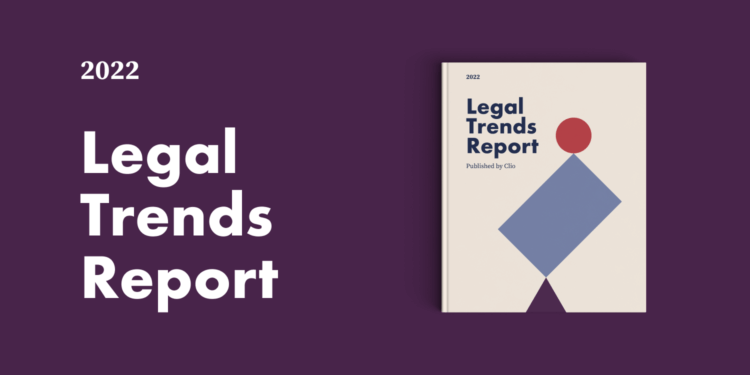Clio’s Legal Trends Report uncovers unparalleled revenue growth as law firms grapple work-life dynamics
October 10, 2022


Amid inflation, volatile employment markets, economic slowdowns, and changing workplace preferences, law firms experience an unprecedented boom as many lean into technology solutions.
Today, Clio, the world’s leading provider of cloud-based legal technology, released its 2022 Legal Trends Report, uncovering a new era of work at law firms during a period of considerable business growth. Since 2021, firms have seen a rebound in business while navigating macroeconomic challenges including inflation and demand. The report also reveals higher than average resignation rates across the legal industry. Finding balance amid instability is a cornerstone of this year’s findings.
Highlights from the 2022 Legal Trends Report include:
- On average, lawyer fees are 3% below where they should be given recent trends in inflation
- New business growth among law firms increased an average of 10% from March 2021 to June 2022
- Of the 1 in 5 lawyers who changed jobs in the last 12 months, 37% indicated better work-life balance was a factor in their decision
- Lawyers using cloud-based LPMS were 29% more likely to be happy with their professional life
- A divided workforce is revealed with 49% of lawyers indicating a preference to work from home
“The past two years have fundamentally changed how lawyers define the role of work in their lives,” said Jack Newton, CEO and Founder of Clio. “The challenge for every law firm is to meet the expectations of clients and employees while balancing business objectives in a fluctuating economy. Technology is enabling much-needed flexibility for today’s lawyers, and this latest report inspires Clio to keep innovating for a transformative and sustainable legal future.”
The impact of inflation on the cost of legal services
Clio’s Billable Hour Index measures the average cost for an hour of legal services in the United States, reported annually in the Legal Trends Report. In a comparison of the Billable Hour Index and Consumer Price Index over time, the average price of legal services hasn’t kept pace with the increased costs of goods and services since 2019.
- Measured by changes in the Consumer Price Index (CPI), inflation has risen dramatically this year, reaching as high as 9.1% in mid-2022
- On average, lawyer fees are 3% below where they should be given recent trends in inflation
This gap could result in a hike of law firm rates in 2023 as firms seek to rebalance the growing rate of expenditures versus revenues to pre-pandemic levels.
Law firms need to prepare for both boom and bust periods
Insights from the report show a steady overall increase in the number of matters law firms handle.
Compared to the 2019, or the last “normal” year, the average caseload was up 10% during March 2021 to June 2022, while average billable hours were 22% higher during the same time. On average, lawyers are billing more hours for every case they take on.
Over the same period of time, the number of hours billed to clients was up by an average of 28% compared to 2019, and average collected revenue was up by 31%, meaning that every hour of legal work has become more valuable to firms overall.
- Utilization rates alone saw a 6% relative increase from 2021, a considerable leap compared to the incremental increases reported in previous years
- Realization and collection rates have sustained the significant increase seen in recent years, remaining at 84% and 89% respectively
- Despite recent increases, firms could still collect up to 34% more revenue by optimizing realization and collection rates
Firms will have to manage fluctuating workloads as they rise and fall with demand for legal services. Along with more revenue, the current boom means increased workloads in managing communications, document handling, deadlines, billing, and payment collections. While firms may be busier and collect more revenue than years prior, global trends in inflation and rising interest rates could result in increased expenditures and potential slowdowns throughout the remainder of 2022 and into 2023.
The past year’s high demand for legal services has meant significant financial opportunity for many firms. But with sustained inflation and increasingly grim forecasts of a recession on the horizon, there are clear warning signs that the industry needs to prepare for a challenging year ahead. Clio’s research team will continue to monitor trends across the industry to equip legal professionals with the tools they need to become not just resilient, but truly antifragile.
Irregular and non-optimal work schedules are the norm for lawyers
Survey data reveals the unprecedented boom in monthly revenue and increasing irregular working hours to meet increased client demand and deadlines. Since 2020, the lines between work life and personal life have blurred.
- 86% of lawyers say they work outside a 9 a.m. to 5 p.m. workday
While many lawyers may opt to work outside a 9 a.m. to 5 p.m. schedule, many may be working evenings and weekends to meet clients’ needs. At least 69% of lawyers communicate with clients on weekends and 74% after hours. Some may be eager to meet their clients outside of business hours. And yet, those working irregular schedules report lower job satisfaction.
- Lawyers who work regular hours rated their mental and emotional wellness much higher (68%) compared to those who work outside regular hours (51%)
Those who work regular hours were also more satisfied with what they were earning for their practice, and were equally satisfied with their personal salary as those who do not work regular hours. Lawyers who extended work into irregular hours did not derive any additional satisfaction in their salaries.
Lawyers want flexible work arrangements and fewer days in the office
The “Great Resignation” has swept through the legal industry with resignation rates as high as 19%. Compared to non-legal professionals, this outsized movement signals an employee’s market with demands that include work-life balance and higher salaries.
Lawyers seek increased flexibility in both where and when they work. New technology-enabled capabilities are part of a longer-term shift that has further driven demand for more remote-enabled legal services. Among those who left or planned to leave a job, work-life balance was just as likely as salary to influence their decision.
- 37% of legal professionals cited salary increase as a reason for changing jobs
- 37% of legal professionals cited work-life balance as a reason for changing jobs
While the data suggests legal professionals have returned to working regularly from an office, they’ve also embraced workplace flexibility, spending less time in an office overall.
- Before 2020, about 40% of lawyers worked exclusively from an office—now, fewer than 30% do.
Firms that don’t offer location flexibility may have trouble competing for talent amongst professionals who want to work from home. The legal industry is almost exactly divided on this topic, with 49% of lawyers expressing a preference to work from home. To remain competitive, a flexible approach to the office and its role in both personal and professional well-being is better aligned to these preferences.
Firms using cloud-based legal practice management software (LPMS) are succeeding in a new era of work
As more lawyers embrace flexible working environments, data from the report shows that firms yet to adopt the cloud-based LPMS may struggle to maintain continuity.
Legal professionals working at firms that use cloud-based LPMS express more satisfaction in their roles than those at firms that don’t. More significantly, cloud users report having good relationships with clients.
- Lawyers using cloud-based LPMS to manage their practice were 60% more likely to have positive relationships with their clients users
Cloud users also realized additional benefits, from greater enjoyment of working with others at their firm, flexible work schedules, and overall positive satisfaction with work.
Lawyers using cloud-based LPMS were:
- 44% more likely to have positive relationships with colleagues
- 44% more likely to want to work throughout the day rather than a traditional 9-to-5 schedule
- 29% more likely to be happy with their professional life
“A law firm’s most valuable asset is its people—lawyers, professionals, and clients are all integral to the success of the firm,” said Newton. “For a long time, finding a healthy, productive balance between work and personal life meant a sacrifice on either front. Today’s thriving firms can embrace new models for work-life balance, and capitalize on opportunities for growth well into the future with a better understanding of the path forward.”
Clio’s annual Legal Trends Report is the industry’s leading study of law firms, lawyers, and legal consumers. Now in its seventh year of publication, it’s considered the benchmark data on key insights into legal practice business.
The 2022 Legal Trends Report is now available at clio.com/ltr.
Media Contact:
Juliet Mafua, Senior Public Relations Specialist, Clio
1-800-347-8314
[email protected]